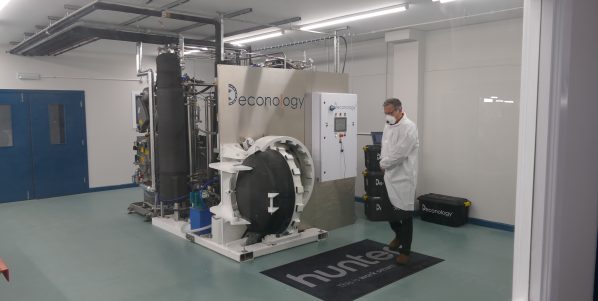Hunter Blog
PFAS in Critical PPE: A Procurement Perspective
Hunter Apparel Solutions Limited (Hunter) is at the forefront of tackling harmful contamination which can be found in PPE of exposed wearers. Our mission is to protect those on whom society depends, and we have demonstrated that by being the first in the UK and Ireland to adopt a Liquid CO₂+ (LCO₂+) decontamination system for PPE called Deconology®.
According to NFPA testing, LCO2+ decontamination, enhanced with eco-friendly additives, penetrates beyond the outer layer of PPE including even waterproof moisture barriers! Something that water-based washing methods cannot do.
This innovative process effectively removes carcinogenic contaminants, including hazardous NFPA-specified substances.
Through our pioneering Deconology® system, we’re helping those who wear PPE to have reduced exposure to harmful substances, while staying ahead of regulatory shifts and environmental obligations.
Awareness of PFAS in PPE has risen sharply in the UK due to ongoing regulatory reviews, environmental contamination findings, mounting public concern, and emerging legal and financial risks. In April to June 2024, the Health and Safety Executive (HSE), backed by the Environment Agency, launched formal calls for evidence on PFAS use. This high‐profile move signalled a shift toward precautionary regulation, and Deconology® can be your solution to this.
What Are PFAS and Why Do They Matter?
Per- and polyfluoroalkyl substances (PFAS) are a group of synthetic chemicals known for their durability and resistance to water, oil, and heat. These characteristics have made them commonplace in PPE used across fire, police, rail, and utility services. However, PFAS are increasingly linked to serious health risks, including liver damage, cancer, thyroid disruption, and immune system effects. Recent studies, including those by the National Institute of Standards and Technology (NIST), reveal that PFAS can penetrate all layers of firefighter PPE and intensify with wear. With PFAS often dubbed “forever chemicals” due to their environmental persistence, the challenge is not just about protecting wearers but also safeguarding communities and ecosystems.
Managing PFAS Risk in the UK
In the UK, concern around PFAS exposure is gaining momentum. The Health and Safety Executive (HSE) and the Environment Agency are actively exploring restrictions under UK REACH, focusing initially on firefighting foams and PPE. Although binding regulations are still evolving, organisations are strongly encouraged to take early action.
This is where procurement plays a vital role. By selecting advanced decontamination methods like Deconology®, procurement professionals can align their operations with national health, safety, and sustainability priorities.
Why Traditional Cleaning Isn’t Enough
Standard water-based washing methods often fall short in removing PFAS and can even contribute to wider environmental contamination by discharging these substances into wastewater. Moreover, traditional laundering consumes large volumes of water and energy, compounding the environmental impact.
In contrast, Deconology® uses a closed-loop LCO₂+ system that effectively extracts loose PFAS and other toxins from PPE without releasing harmful residues into the environment. This method avoids water use altogether and captures contaminants for safe disposal—making it a safer choice for people and the planet.
Priorities for Procurement Professionals
Procurement teams across the public safety and infrastructure sectors are uniquely positioned to drive meaningful change. Here’s how:
Adopt Advanced Decontamination Technology: Deconology® achieves over 99% removal of harmful substances such as PAHs and PFAS, while also protecting the integrity of the garments, based on NFPA testing. Hunter is proud to be the first to introduce this system to the UK and Ireland.
Integrate Closed-Loop Systems into Specifications: Procurement frameworks should include requirements for closed-loop decontamination to ensure no PFAS enters the water supply.
Stay Ahead of Regulation: The HSE and Environment Agency, alongside international efforts from the EU and Stockholm Convention, are moving toward tighter PFAS regulation. By embedding these developments into procurement strategies now, organisations can future-proof their compliance and avoid costly retrofits later.
The Benefits of Forward-Thinking Procurement
By updating procurement practices to address PFAS risks, organisations can achieve multiple operational benefits:
-
- Health & Safety: Minimises exposure to PFAS and other contaminants for frontline workers.
- Cost Efficiency: Extends the usable life of PPE, reducing the need for frequent replacements.
- Regulatory Readiness: Aligns with anticipated legislation and industry standards.
- Environmental Stewardship: Prevents environmental discharge and supports sustainability objectives.
As scrutiny around PFAS intensifies in the UK and beyond, procurement professionals in the fire, police, rail, and utility sectors have a critical opportunity to lead by example. By specifying closed-loop decontamination systems like Deconology®, and embedding chemical transparency in supplier contracts, procurement teams can protect their workforce, meet evolving regulations, and uphold environmental commitments.
To explore how Deconology® can support your team’s PPE management, contact us at sales@hunterapparelsolutions.com or call 028 7126 2542.




